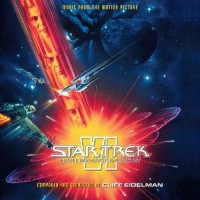- Composed by Cliff Eidelman
- Intrada / 2012 / Score 67:14 / Original album 45:17
Paramount decided in 1991 that it was time for William Shatner and co to retire from the USS Enterprise – the previous film had not been a success and a new generation was seeking out strange new worlds on the television. They turned to Nicholas Meyer to make the sixth film – he had directed the second (and easily the best) in the series and co-written the fourth (easily the most financially successful), so it made sense. Keen to do something very different from before, Star Trek VI: The Undiscovered Country took the franchise in a new direction – a political thriller mirroring the demise of the Soviet Union in the collapse of the Klingon Empire, despite some gaping plot holes it makes for a very strong film and was a great way for the beloved original cast to sign off.
Meyer couldn’t afford Jerry Goldsmith for Star Trek II, so turned instead to a talented but largely unknown composer to provide the score – James Horner. He faced a similar challenge on this film and did a very similar thing – this time giving the job to Cliff Eidelman. If Eidelman’s career post-Star Trek hasn’t exactly panned out the way that Horner’s did, it’s certainly nothing to do with the quality of music he wrote for the film, which – in keeping with every one of its predecessors in the series – is very impressive. Meyer’s original plan was for Eidelman to adapt Holst’s The Planets for the film’s score, but licencing the music proved too expensive – probably a blessing in disguise.
There are echoes of The Planets running through the score anyway, but it’s another of the great classics, Stravinsky’s Firebird, that seems to have inspired the opening moments of the score. Unlike in the previous films, there is no bright, optimistic piece of music heralding the opening of the film; instead, Eidelman’s overture is dark, foreboding, centring on his Klingon theme. It’s a powerful opening and sets the tone for the generally dark music which dominates the score. The main exception is the wonderful theme for Captain Kirk, which offers a more traditional Star Trek view in its main appearances, like “Clear All Moorings” and the emotional “Sign Off”. Spock’s theme – whose most extended appearance ironically comes in “Escape from Rura Penthe”, in which Spock doesn’t even appear – isn’t a million miles from the approach Horner took to the character, usually slightly cold and restrained, but for that sequence rising to a grand sweep for the beautiful ice planet shots.
“Assassination” is a great piece of action music, Eidelman’s intricate orchestral music being joined by a male choir (the first use of a choir in a Star Trek score). “Rura Penthe” offers a different kind of action, a whole host of percussion offering a hint of barbarism at the penal colony, before the choir starts chanting “To be or not to be” – in Klingon! By far the most notable musical set-piece, though, is “The Battle for Peace”. Eidelman runs through most of his key themes for the score during the lengthy (eight-minute) sequence, which (slightly counter-intuitively) seems to run slightly more cohesively in the film version presented here than it did in its original album version. The concluding “Sign Off” is an emotional highpoint (making wonderful use of the famous Alexander Courage fanfare – used sparingly through the rest of the score), the end credits suite a terrific summary of the score’s main ideas.
Intrada’s album features the hour-long score plus some bonuses on its first disc and then offers the original album arrangement on the second. It’s a very fine score, though of the expanded Star Trek movie soundtracks released so far, it’s probably the one that benefits least from the expansion. The new music doesn’t detract at all and I’m sure all of the score’s fans will be pleased to hear more of the same, but the best material was all released already. The excellent liner notes are oddly uncredited but presumably by Jeff Bond and make for entertaining reading. This is a high-quality package and, most importantly, presents some hugely enjoyable music. I’m amazed it didn’t lead to Cliff Eidelman scoring a load of bigger films, but he’s still managed to write some fine music in the couple of decades since; this remains his career highlight to date. ****













It‘s quiet in here! Why not leave a response?